初中英语外研版八上Module 1 How to learn English Unit 3 Language in use课件(共22张PPT)
文档属性
| 名称 | 初中英语外研版八上Module 1 How to learn English Unit 3 Language in use课件(共22张PPT) | 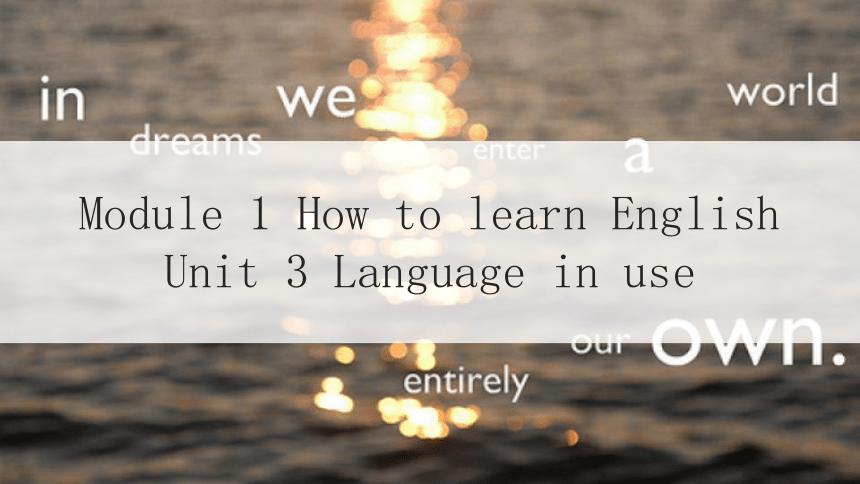 | |
| 格式 | pptx | ||
| 文件大小 | 1.6MB | ||
| 资源类型 | 教案 | ||
| 版本资源 | 外研版 | ||
| 科目 | 英语 | ||
| 更新时间 | 2023-08-30 14:14:34 | ||
图片预览

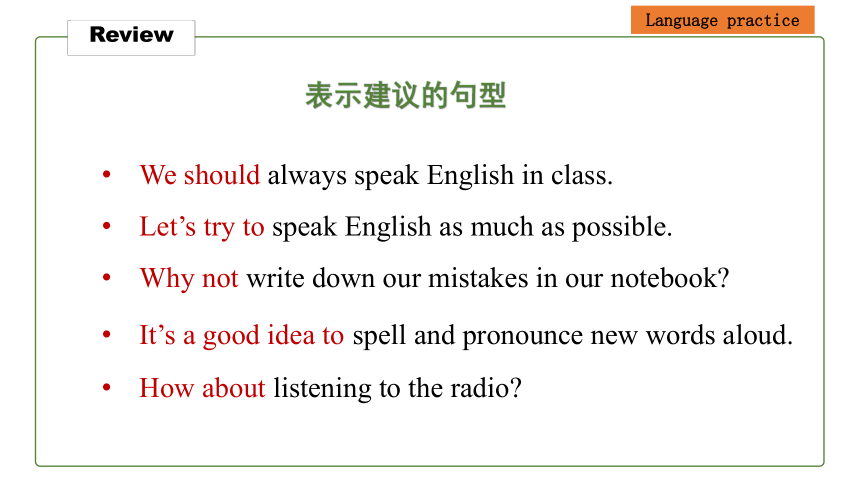
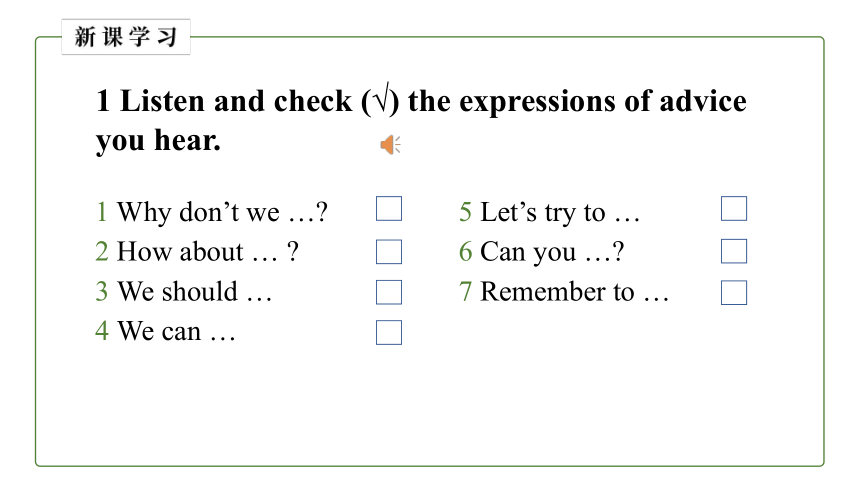
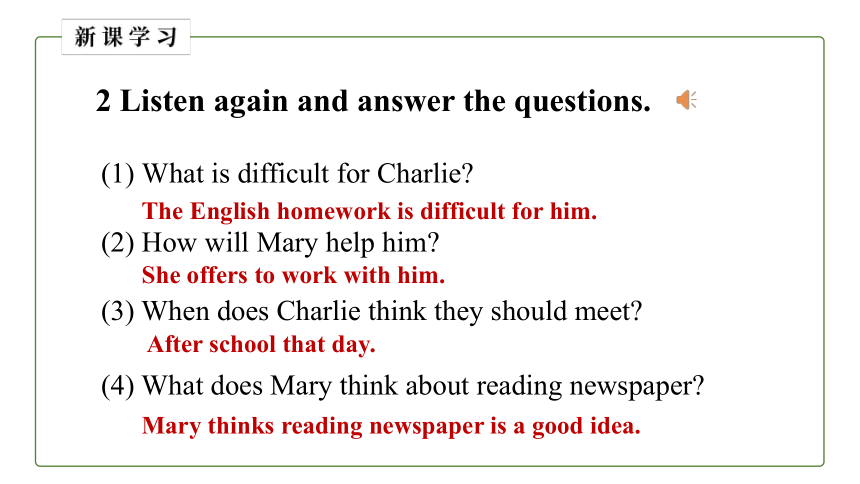
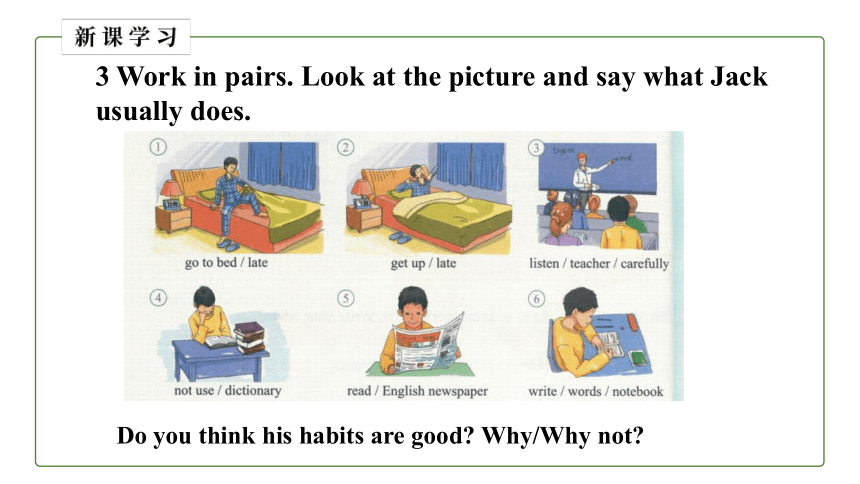
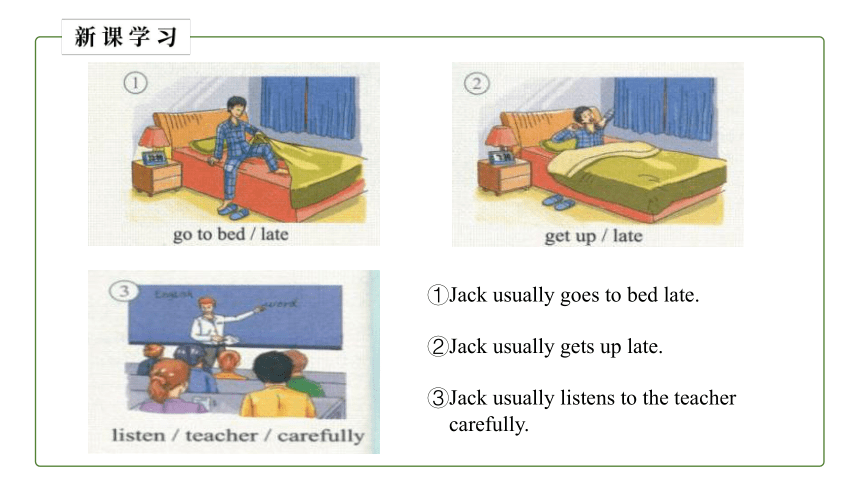
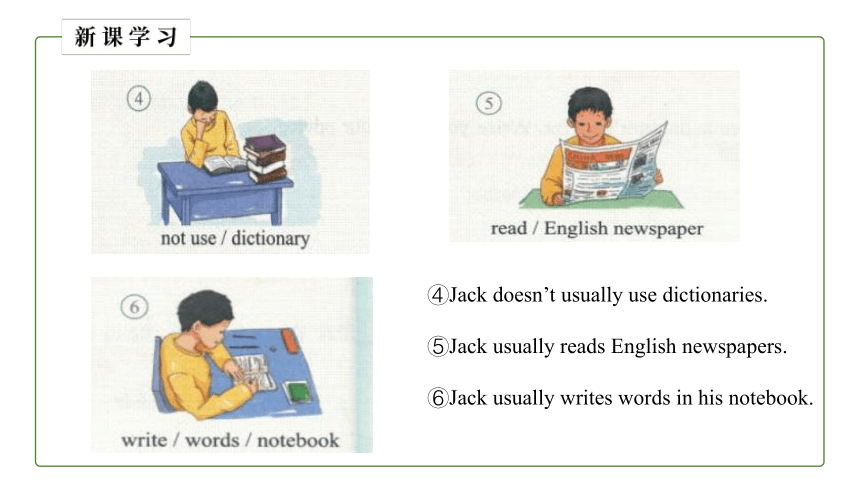
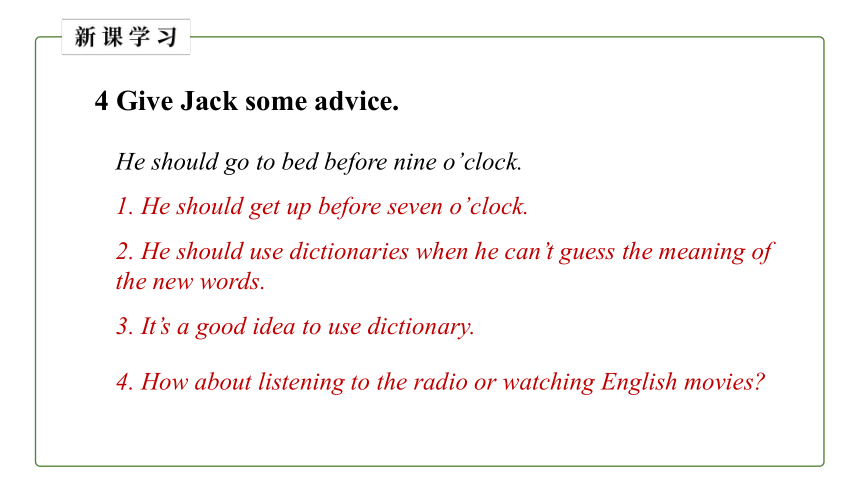
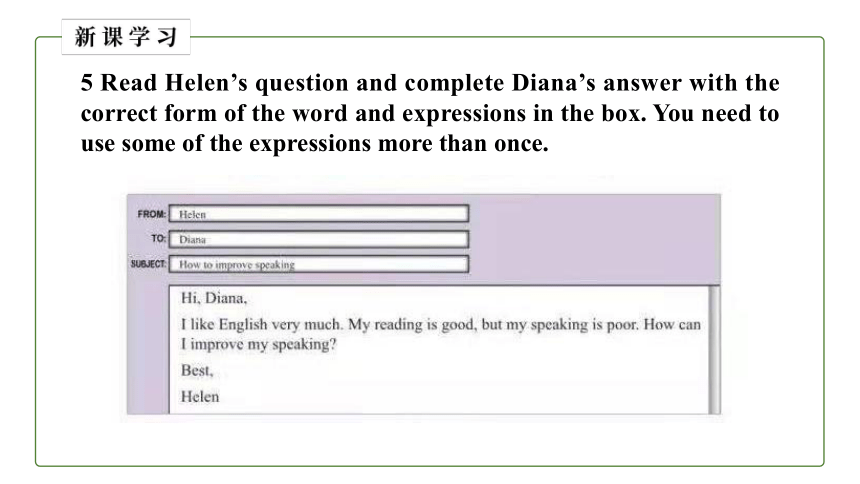
文档简介
(共22张PPT)
Module 1 How to learn English
Unit 3 Language in use
Review
表示建议的句型
Language practice
We should always speak English in class.
Let’s try to speak English as much as possible.
Why not write down our mistakes in our notebook
It’s a good idea to spell and pronounce new words aloud.
How about listening to the radio
1 Listen and check (√) the expressions of advice you hear.
1 Why don’t we …
2 How about …
3 We should …
4 We can …
5 Let’s try to …
6 Can you …
7 Remember to …
2 Listen again and answer the questions.
(1) What is difficult for Charlie
(2) How will Mary help him
(3) When does Charlie think they should meet
(4) What does Mary think about reading newspaper
The English homework is difficult for him.
She offers to work with him.
After school that day.
Mary thinks reading newspaper is a good idea.
3 Work in pairs. Look at the picture and say what Jack usually does.
Do you think his habits are good Why/Why not
①Jack usually goes to bed late.
②Jack usually gets up late.
③Jack usually listens to the teacher
carefully.
④Jack doesn’t usually use dictionaries.
⑤Jack usually reads English newspapers.
⑥Jack usually writes words in his notebook.
4 Give Jack some advice.
He should go to bed before nine o’clock.
1. He should get up before seven o’clock.
2. He should use dictionaries when he can’t guess the meaning of the new words.
3. It’s a good idea to use dictionary.
4. How about listening to the radio or watching English movies
5 Read Helen’s question and complete Diana’s answer with the correct form of the word and expressions in the box. You need to use some of the expressions more than once.
Why don’t
How about
Try to
why not
How about
try to
should
6 Work in pairs. Read the problems of Student A and Student B. Take turns to give advice. Use the expressions in the box to help you.
ask your teacher read aloud talk to your classmates use a dictionary
Student A’s problems Student B’s problems
I like listening to English songs, but there are too many new words. I can’t speak English well.
I want to read an English book, but I can’t choose the right one. It’s difficult to remember new words.
Now write down your advice.
You should use a dictionary to find the meaning of new words.
7 Complete the conversation with the words in the box.
advice check forget improve possible
Helen: How can I (1)__________ my reading
James: Here is my (2) __________. Choose a newspaper to read. First think about what’s happening today. What will be in the newspaper Then read the titles of articles and choose one to read for more information. Don’t stop to (3)________ every word. You don’t need to know every word to understand the article. Learning only a few new words is enough. Try to use them as much as (4)________. Then you won’t (5) __________ them easily.
improve
advice
possible
forget
check
1. Try to make friends with them and take them around your town.
① make friends 交朋友
make friends with sb. 与……交朋友
② take sb. around ... = show sb. around ...带领某人参观……
Language points
e.g. I will take/show you around new school.
e.g. I want to make friends with people all over the world.
2. If there is not, why not start one with your friends
one与it辨析
Language points
one 用于代替前面提到的同类人或物中的一个 复数为ones
it 用于代替前面提到的同一个人或物 复数为they/them
e.g. I have no rules. Can you lend me one
I have a ruler. I can lend it to you.
3. How about playing a few games and listening to some music
few, a few, little和a little辨析
Language points
e.g. There are few students in the playground. 操场上几乎没有学生。
There are a few students in the playground. 操场上有几个学生。
few 没有几个 修饰可数名词复数 表示否定
a few 几个 表示肯定
little 几乎没有 修饰不可数名词 表示否定
a little 一点儿 表示肯定
There is little water in the bottle. 瓶子里几乎没有水。
There is a little water in the bottle. 瓶子里有一点儿水。
4. You should invite your new English-speaking friends to your club!
invite [v.] 邀请
Language points
① invite sb. to+地点 邀请某人去某地
e.g. I will invite all my friends to my birthday party.
② invite sb. to do sth. 邀请某人去做某事
e.g. My friend invited me to take part in his birthday party.
5. Don’t stop to check every word.
Language points
stop doing sth. 停止做某事 指停止正在做的事情
stop to do sth. 停下来去做某事 指停下正在做的事而去做另一件事
stop [v.] 停止
e.g. You should stop talking when the teacher comes in.
Let’s stop to have a rest.
( ) 1. I’m not good at English. I have to work hard _______ it.
A. improve B. to improve C. to correct D. to check
( ) 2. Can you tell me some _________ about the Brazil Olympic Games (奥运会)
—OK. Let me help you search the Internet.
A. language B. information C. advantage D. document
( ) 3. — I’m a little hungry, mum!
— There are some apple pies on the table, you may take ______.
A. it B. this C. that D. one
习 题
B
B
D
( ) 4. Here is my new phone number. Please take out your notebook and ______.
A. write down it B. write it down
C. write them down D. write down them
( ) 5. —What’s your plan for the coming weekend
— ________ go to fly kites
A. Why no B. How about C. Why don’t we D. Let’s
( ) 6. —Don’t forget ________ your homework, John. —OK. I’ll do it right now.
A. doing B. to do C. did D. do
B
C
B
few 没有几个 修饰可数名词复数 表示否定
a few 几个 表示肯定
little 几乎没有 修饰不可数名词 表示否定
a little 一点儿 表示肯定
stop doing sth. 停止做某事 指停止正在做的事情
stop to do sth. 停下来去做某事 指停下正在做的事而去做另一件事
① few, a few, little和a little辨析
② stop用法
1. 完成作业本。
2. 背诵今天所学知识点。
3. 背诵课文。
Module 1 How to learn English
Unit 3 Language in use
Review
表示建议的句型
Language practice
We should always speak English in class.
Let’s try to speak English as much as possible.
Why not write down our mistakes in our notebook
It’s a good idea to spell and pronounce new words aloud.
How about listening to the radio
1 Listen and check (√) the expressions of advice you hear.
1 Why don’t we …
2 How about …
3 We should …
4 We can …
5 Let’s try to …
6 Can you …
7 Remember to …
2 Listen again and answer the questions.
(1) What is difficult for Charlie
(2) How will Mary help him
(3) When does Charlie think they should meet
(4) What does Mary think about reading newspaper
The English homework is difficult for him.
She offers to work with him.
After school that day.
Mary thinks reading newspaper is a good idea.
3 Work in pairs. Look at the picture and say what Jack usually does.
Do you think his habits are good Why/Why not
①Jack usually goes to bed late.
②Jack usually gets up late.
③Jack usually listens to the teacher
carefully.
④Jack doesn’t usually use dictionaries.
⑤Jack usually reads English newspapers.
⑥Jack usually writes words in his notebook.
4 Give Jack some advice.
He should go to bed before nine o’clock.
1. He should get up before seven o’clock.
2. He should use dictionaries when he can’t guess the meaning of the new words.
3. It’s a good idea to use dictionary.
4. How about listening to the radio or watching English movies
5 Read Helen’s question and complete Diana’s answer with the correct form of the word and expressions in the box. You need to use some of the expressions more than once.
Why don’t
How about
Try to
why not
How about
try to
should
6 Work in pairs. Read the problems of Student A and Student B. Take turns to give advice. Use the expressions in the box to help you.
ask your teacher read aloud talk to your classmates use a dictionary
Student A’s problems Student B’s problems
I like listening to English songs, but there are too many new words. I can’t speak English well.
I want to read an English book, but I can’t choose the right one. It’s difficult to remember new words.
Now write down your advice.
You should use a dictionary to find the meaning of new words.
7 Complete the conversation with the words in the box.
advice check forget improve possible
Helen: How can I (1)__________ my reading
James: Here is my (2) __________. Choose a newspaper to read. First think about what’s happening today. What will be in the newspaper Then read the titles of articles and choose one to read for more information. Don’t stop to (3)________ every word. You don’t need to know every word to understand the article. Learning only a few new words is enough. Try to use them as much as (4)________. Then you won’t (5) __________ them easily.
improve
advice
possible
forget
check
1. Try to make friends with them and take them around your town.
① make friends 交朋友
make friends with sb. 与……交朋友
② take sb. around ... = show sb. around ...带领某人参观……
Language points
e.g. I will take/show you around new school.
e.g. I want to make friends with people all over the world.
2. If there is not, why not start one with your friends
one与it辨析
Language points
one 用于代替前面提到的同类人或物中的一个 复数为ones
it 用于代替前面提到的同一个人或物 复数为they/them
e.g. I have no rules. Can you lend me one
I have a ruler. I can lend it to you.
3. How about playing a few games and listening to some music
few, a few, little和a little辨析
Language points
e.g. There are few students in the playground. 操场上几乎没有学生。
There are a few students in the playground. 操场上有几个学生。
few 没有几个 修饰可数名词复数 表示否定
a few 几个 表示肯定
little 几乎没有 修饰不可数名词 表示否定
a little 一点儿 表示肯定
There is little water in the bottle. 瓶子里几乎没有水。
There is a little water in the bottle. 瓶子里有一点儿水。
4. You should invite your new English-speaking friends to your club!
invite [v.] 邀请
Language points
① invite sb. to+地点 邀请某人去某地
e.g. I will invite all my friends to my birthday party.
② invite sb. to do sth. 邀请某人去做某事
e.g. My friend invited me to take part in his birthday party.
5. Don’t stop to check every word.
Language points
stop doing sth. 停止做某事 指停止正在做的事情
stop to do sth. 停下来去做某事 指停下正在做的事而去做另一件事
stop [v.] 停止
e.g. You should stop talking when the teacher comes in.
Let’s stop to have a rest.
( ) 1. I’m not good at English. I have to work hard _______ it.
A. improve B. to improve C. to correct D. to check
( ) 2. Can you tell me some _________ about the Brazil Olympic Games (奥运会)
—OK. Let me help you search the Internet.
A. language B. information C. advantage D. document
( ) 3. — I’m a little hungry, mum!
— There are some apple pies on the table, you may take ______.
A. it B. this C. that D. one
习 题
B
B
D
( ) 4. Here is my new phone number. Please take out your notebook and ______.
A. write down it B. write it down
C. write them down D. write down them
( ) 5. —What’s your plan for the coming weekend
— ________ go to fly kites
A. Why no B. How about C. Why don’t we D. Let’s
( ) 6. —Don’t forget ________ your homework, John. —OK. I’ll do it right now.
A. doing B. to do C. did D. do
B
C
B
few 没有几个 修饰可数名词复数 表示否定
a few 几个 表示肯定
little 几乎没有 修饰不可数名词 表示否定
a little 一点儿 表示肯定
stop doing sth. 停止做某事 指停止正在做的事情
stop to do sth. 停下来去做某事 指停下正在做的事而去做另一件事
① few, a few, little和a little辨析
② stop用法
1. 完成作业本。
2. 背诵今天所学知识点。
3. 背诵课文。
同课章节目录
- Module 1 How to learn English
- Unit 1 Let's try to speak English as much as possi
- Unit 2 You should smile at her.
- Unit 3 Language in use .
- Module 2 My home town and my country
- Unit 1 It's taller than many other buildings.
- Unit 2 Cambridge is a beautiful city in the east o
- Unit 3 Language in use .
- Module 3 Sports.
- Unit 1 Nothing is more exciting than playing tenni
- Unit 2 This year we training more carefully.
- Unit 3 Language in use .
- Module 4 Planes, ships and trains .
- Unit 1 He lives the farthest from school.
- Unit 2 What is the best way to travel.
- Unit 3 Language in use .
- Module 5 Lao She Teahouse.
- Unit 1 I wanted to see the Beijing Opera.
- Unit 2 It descibes the changes in Chinese society.
- Unit 3 Language in use .
- Module 6 Animals in danger.
- Unit 1 It allows people to get closer to them .
- Unit 2 The WWF is working hard to save them all.
- Unit 3 Language in use .
- Revision module A
- Module 7 A famous story
- Unit 1 Alice was sitting with her sister by the ri
- Unit 2 She was thinking about her cat.
- Unit 3 Language in use .
- Module 8 Accidents
- Unit 1 While the car were changing to red, a car s
- Unit 2 I was trying to pick it up when it bite me
- Unit 3 Language in use .
- Module 9 Population
- Unit 1 The population of China is about 1.37 billi
- Unit 2 Arnwick was a city with 200,000 people.
- Unit 3 Language in use .
- Module 10 The weathe
- Unit 1 It might snow.
- Unit 2 The weather is fine all year round.
- Unit 3 Language in use .
- Module 11 Way of life
- Unit 1 In China ,we open a gift later.
- Unit 2 In England, you usually drink tea with milk
- Unit 3 Language in use .
- Module 12 Help
- Unit 1 What should we do before help arrives?
- Unit 2 Stay away from windows and heavy furniture.
- Unit 3 Language in use .
- Revision module B
